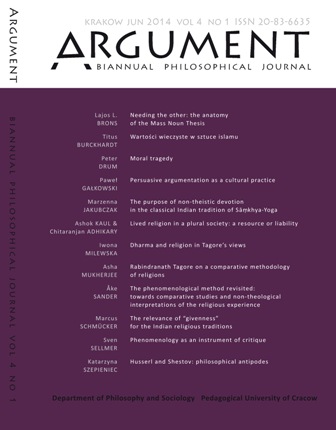The Relevance of “Givenness” for the Indian Religious Traditions
The Relevance of “Givenness” for the Indian Religious Traditions
Author(s): Marcus SchmückerSubject(s): Indian Philosophy, Cultural Anthropology / Ethnology
Published by: Wydawnictwo Uniwersytetu Komisji Edukacji Narodowej w Krakowie
Keywords: Jean-Luc Marion; Indian philosophy; phenomenology of religion; continental philosophy; subjectivity; Advaita Vedānta
Summary/Abstract: The paper focuses on comparing some of the main results of the European tradition of phenomenology of religion represented and further developed by Jean-Luc Marion. His views on the constitution of the “I” appear promising for a comparison when contrasted with the views on the same phenomenon in Indian religious traditions. Marion, whose rich work is mainly devoted to the philosophy of donation, discovered a new way that led him from the givenness of the object of knowledge/perception, to the understanding of self-givenness of the subject, to a new understanding of the experience of god. The author chooses as a start ing point the central question in Marion’s work: the constitution of the “I” and the problem of whether it is able to constitute itself or whether something exists that constitutes the “I” beforehand without leaving the concept of subjectivity. For the Indian side, he offers examples for the way in which the constitution of the “I” takes place or not and what relevance a kind of givenness has in this context not only for a concept of the subject but also for the theistic ideas in Indian traditions.
Journal: ARGUMENT: Biannual Philosophical Journal
- Issue Year: IV/2014
- Issue No: 1
- Page Range: 43-54
- Page Count: 12
- Language: English

